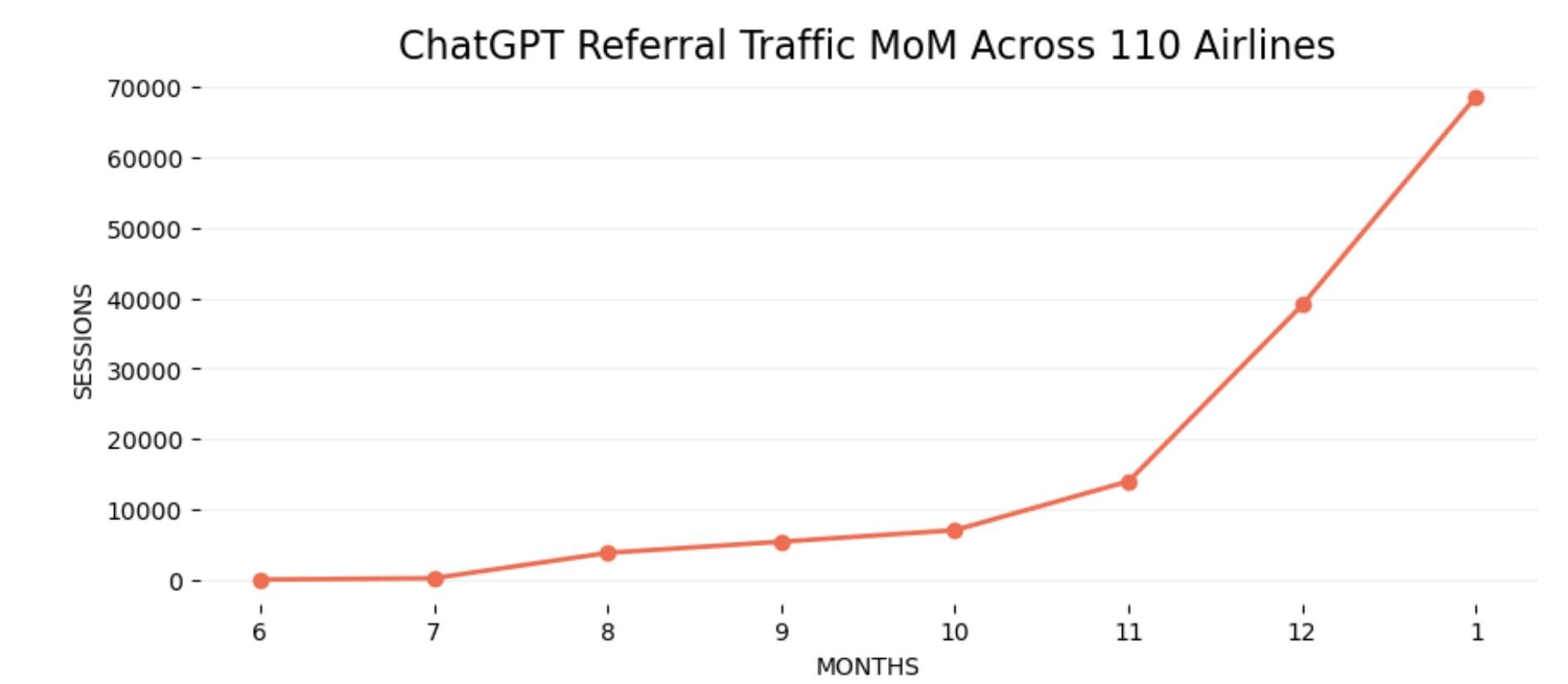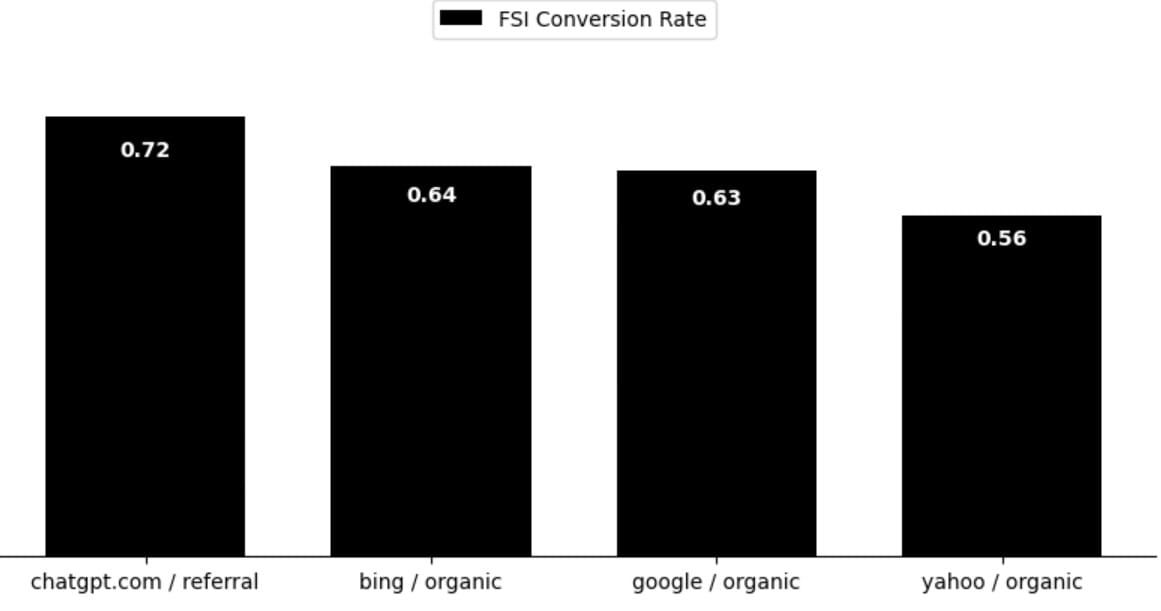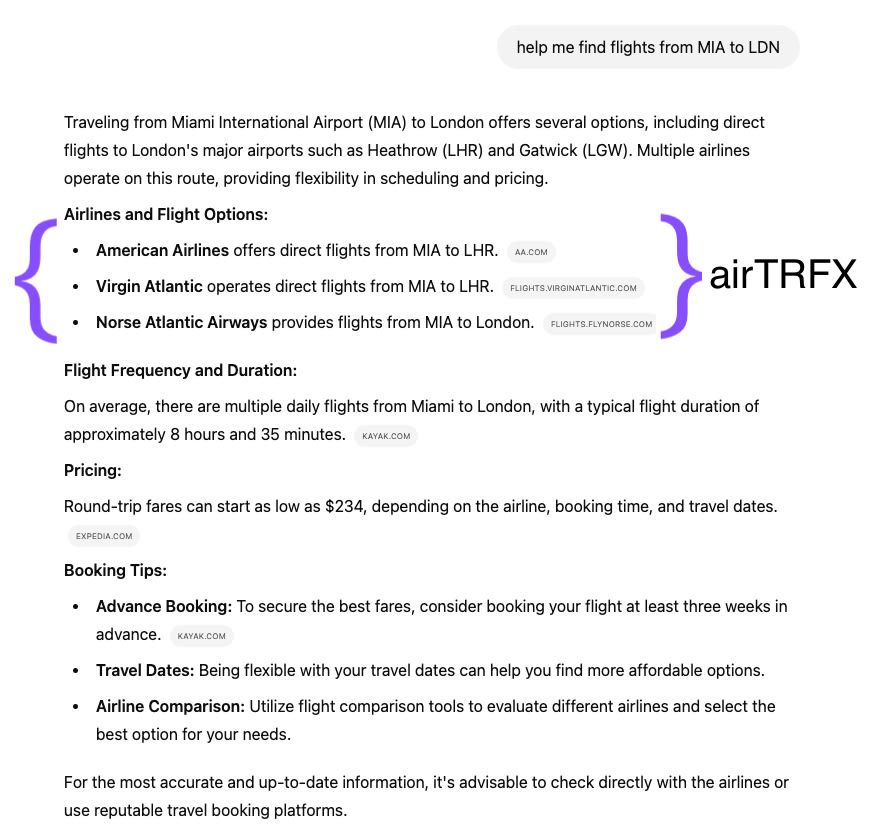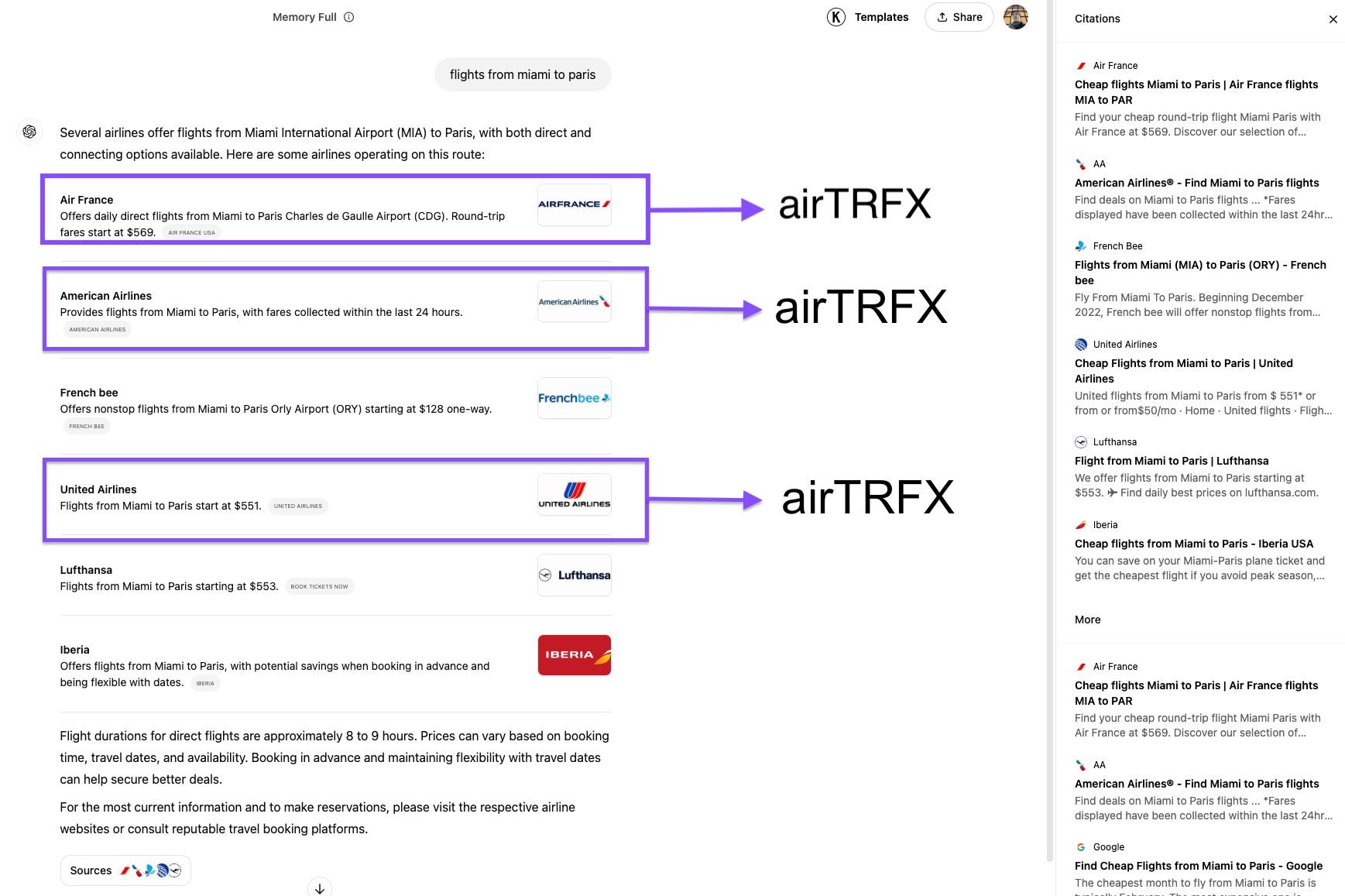From dynamic fare pricing tools to customized chatbots that support user experience, AI has been a part of the airline industry for many years. Nowadays, Generative AI has gone beyond the back-end algorithm unseen by travelers and is reshaping how users search for and book flights.

With nearly 300 million weekly active users Large Language Models (LLMs), like ChatGPT, are increasingly becoming one of users’ go-to tools for information, inspiration, and decision-making.1 AI Search Engines enabling highly personalized trip planning are influencing the customer journey and how users ultimately book their trips—which is starting to drive an interesting shift in traffic patterns. Instead of relying solely on traditional search engines, travelers are turning to AI-driven platforms to research destinations, find ideal itineraries, compare fares, and plan their trips. For instance, a Forbes study on AI statistics and trends suggests that 38% of users plan to use AI in 2025 to ‘Plan a travel itinerary.’2 Therefore, as this trend gains momentum, airlines should start exploring strategies to navigate and succeed in AI-driven environments effectively.
Why This Matters for Airlines
The new era of AI Search Engines raises millions of questions, such as:
- How can my website be featured as a source in ChatGPT responses?
- How does ChatGPT decide which landing pages to show? and in which order?
- Do we have any influence on what is returned to users on ChatGPT?
We don’t have all the answers yet, however, we’ve taken a data-driven approach to analyze and decode the impact of LLMs and Gen-AI’s impact on airTRFX performance.
In this first blog, you can expect an introductory overview of the current ChatGPT referral traffic landscape across 110 airTRFX owners, how airTRFX supports airlines in this AI-led new era, and what is yet to come in this blog series.
We believe this is the beginning of a long journey—and this first introductory analysis is just the take-off. Who knows, as we are still taxiing.
What matters is embracing the AI boom and knowing that versatility is a must.
What We Know So Far: Current LLMs’ Traffic Trends Landscape
With AI-powered, highly personalized trip-planning tools in the hands of travelers, traffic acquisition trends are evolving, and airlines need to understand where their customers are coming from.
In a recent exploratory analysis of 110 airlines using airTRFX landing pages—between June 2024 and January 2025—we observed a significant increase in referral traffic from ChatGPT. In January 2025 alone, traffic from [chatgpt.com / referral + chatgpt.com / (not set)] reached nearly 70,000 sessions—a 75% month-over-month increase compared to December 2024 and 9X larger than the traffic reported in October 2024.

However, that same group of airTRFX customers received a total of 17.5 million organic sessions from traditional search engines in January, meaning traffic from ChatGPT represented less than 0.5% of all organic visits.
While the observed traffic is still a small fraction of the overall sessions across organic acquisition channels, when comparing FSI (Flight Search Initiation)—that is, our proxy metric to conversion rate/transactions—with other traditional search engines, we uncovered that users from ChatGPT convert at a higher rate—8 to 9 percentage points more than Bing and Google respectively. It signals an emerging opportunity for airlines to capture high-intent travelers engaging with AI-driven recommendations.

ChatGPT is largely leading the move towards AI Search Engine traffic. Perplexity.ai, Claude, Deepseek, and Gemini are set to contribute to some sessions from their results, but these are still negligible compared to OpenAI’s top-of-mind product. Thus why, this exploratory analysis focused on ChatGPT traffic and FSI Rate only.
The accelerated traffic growth in the last three months suggests significant changes took place between October and November 2024. Among some underlying causes are the increased adoption and usage of ChatGPT and the integration of SearchGPT within ChatGPT’s interface on October 31st, 2024.3
The new “Search the web” feature enabled real-time data for paid subscribers—enhancing ChatGPT’s capabilities where ChatGPT can act more like a personal assistant, retrieving and sharing links (sources and citations) more frequently when the prompt requires fresher data.
To further catapult this trend, on Feb 5th, OpenAI made its search feature free for its 125+ million daily active users in “regions where ChatGPT is available, and No signup is required.” Moreover, OpenAI’s CEO mentioned in a recent tweet on X.com that “free-tier users will have unlimited chat access in the next few months with the release of GPT-5”4.
Finally, a ChatGPT extension has recently been released on Chrome, encouraging users to set ChatGPT as their default search engine. OpenAI is moving quickly to make its tool the go-to for any kind of task or question, fading the gap between AI versus traditional search engines. No matter how simple or complex your prompt may be, it is a fitting use of AI. Will users jump on this initiative? Only time will tell.

PROS Perspective: AI-Driven Travel is Here to Stay
At PROS, we see this as an exciting transformation in digital travel behavior. As ChatGPT adoption continues growing and gains territory among search engines’ market share, we expect that LLM-driven traffic sources will continue to grow, and jumping on the AI wave will be key to maintaining visibility and relevance.
The good news is that our airTRFX landing pages are already being surfaced in AI-generated responses, and while we continue measuring the full impact, the trend is clear: AI is now partaking in user decision-making, and airlines must be ready to capitalize on this shift.
See below how ChatGPT is displaying airTRFX pages as sources for flight-related prompts such as “help me find flights from MIA to LDN” and “flights from Miami to Paris.”
 |
 |
As AI continues to shape how travelers search and book flights, our priority is to provide our customers with insights that help them stay competitive.
What’s Next: PROS Commitment to Research & Insights
In this preliminary analysis, we learned that AI Search Engine traffic is significantly increasing but it’s still a tiny fraction of overall organic traffic. However, we are closely monitoring the trend, and the team at PROS is committed to staying at the forefront of these AI-driven changes actively researching best practices to help airlines maximize their airTRFX pages’ visibility in AI Search Engines. Our ongoing research will help future-proof our products and ensure that our customers continue to thrive in an evolving digital landscape.
Sources:
- https://backlinko.com/chatgpt-stats
- https://www.forbes.com/advisor/business/ai-statistics/
- https://openai.com/index/introducing-chatgpt-search/
- https://x.com/sama/status/1889755723078443244?s=46&t=uDDw2UXbxNjWitbZ2DhyuQ
- https://skift.com/2024/10/31/hello-google-chatgpt-just-became-a-search-engine/
- https://www.theverge.com/2024/10/31/24283906/openai-chatgpt-live-web-search-searchgpt
Frequently Asked Questions
AI flight search engines, like ChatGPT, use large language models (LLMs) to provide tailored trip-planning experiences. They help users search for flights, compare fares, and plan itineraries through conversational prompts.
ChatGPT referral traffic to airline landing pages has grown significantly, with a 75% month-over-month increase in January 2025. While still a small fraction of overall traffic, it shows higher conversion rates compared to traditional search engines.
ChatGPT users exhibit 8-9 percentage points higher Flight Search Initiation (FSI) rates, indicating stronger purchase intent and a higher likelihood of booking flights.
Airlines can ensure their landing pages, like airTRFX pages, are optimized for AI-generated responses by focusing on customization, relevant content, and seamless user experiences.
airTRFX landing pages are already being surfaced in AI-generated responses, helping airlines capture high-intent travelers and adapt to the growing influence of AI-driven search engines.
The integration of real-time search features in tools like ChatGPT and the growing adoption of AI for trip planning are reshaping how travelers search and book flights.
As AI search engines gain market share, airlines must adapt to maintain visibility and relevance, ensuring they capture high-intent traffic and stay competitive in the evolving digital landscape.

